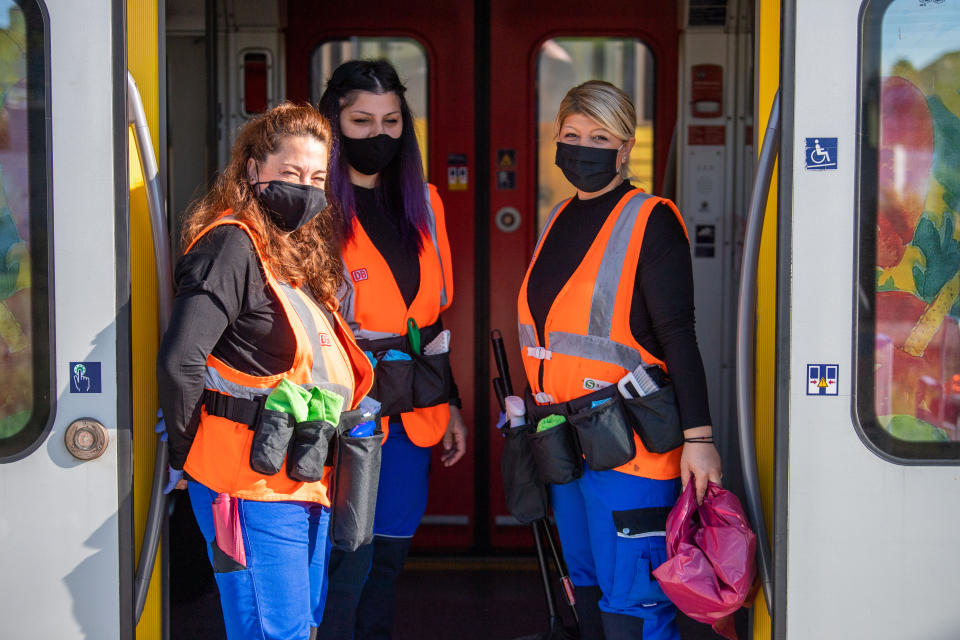Coronavirus: Half a million Britons take online suicide prevention course amid lockdown

More than half a million Britons have logged on to an online suicide prevention course in the past three weeks, according to the organisation behind the scheme.
Amid the coronavirus lockdown, the Zero Suicide Alliance says 503,000 users have completed the module, which aims to spot signs a person may need help.
Scientists have previously warned that the pandemic could have a “profound” and “pervasive” impact on people’s mental health.
Health officials have also said the emotional wellbeing of frontline NHS staff may be affected by the outbreak, with NHS England launching a dedicated mental-health support line for its workers last month.

Coronavirus: Mental health ‘bound to be impacted’
“The stress and worry of the coronavirus is bound to have impacted people's mental health,” said the Zero Suicide Alliance’s Joe Rafferty, the BBC reported.
“Suicide is a serious public health issue and every single death by suicide devastates families, friends and communities.”
The NHS Clinical Leaders Network has also warned that, based on past infectious outbreaks, “we can expect notable increases in mental ill health and related issues for frontline workers as a result of the COVID-19 pandemic”.
Latest coronavirus news, updates and advice
Live: Follow all the latest updates from the UK and around the world
Fact-checker: The number of COVID-19 cases in your local area
Explained: Symptoms, latest advice and how it compares to the flu
Early research suggests the coronavirus is mild in four out of five cases, but it can trigger a respiratory disease called COVID-19.
“While preventing the spread of COVID-19 is still a public health priority, we're saying this emergency will also leave a mental health legacy in its wake, a legacy that could inflict a damaging toll on NHS and other frontline staff as well as the public at large,” said the NHS Clinical Leaders Network.
In the UK and Ireland, 6,859 people died by suicide in 2018.
The network wants an “urgent call to action” before “this problem is upon us”.
The Zero Suicide Alliance, partly funded by the Department of Health, has had 1 million participants since it launched in 2017.
In around 20 minutes, users are “taught” the skills required to help someone who may be considering suicide. The programme also tackles stigma and promotes open communication.
A five- to 10-minute version is also available.
NHS England’s mental-health hotline is reportedly staffed by more than 1,500 volunteers from charities like the Samaritans.
The health service has also partnered with Headspace, UnMind and Big Health to offer support via apps for free.
During mental-health awareness week, the Samaritans launched an app that encourages people to be kind to themselves and look after their mental health.
It aims to provide support for people who may struggle to use the charity’s listening service or who find it difficult to express how they feel when talking.
“During these extraordinary and unprecedented times, it’s so important we look after our mental health and wellbeing as well as our physical health,” said Nadine Dorries, minister for mental health.
“Each and every one of us knows the steps we can take to look after our emotional wellbeing, but this app will be a fantastic resource for anyone struggling during the outbreak or looking for additional support and I’m sure will make a real difference to so many people.”

Coronavirus: ‘Perfect storm’ to harm mental health
Previously, a survey completed by thousands of people all over the world revealed the lockdown has left many feeling anxious, isolated and stressed.
“Increased social isolation, loneliness, health anxiety, stress and an economic downturn are a perfect storm to harm people’s mental health and wellbeing,” said Professor Rory O’Connor from the University of Glasgow.
The UK’s lockdown could trigger everything from domestic abuse and online gambling to relationship breakdowns and feeling a burden – all risk factors for mental-health issues.
As well as potentially mourning the loss of a loved one, people may have to cope with unemployment as businesses shut up shop, unable to cope financially.
A lack of freedom, face-to-face support and sense of purpose may also take its toll.
Scientists have also expressed concerns patients who survive the coronavirus could have an altered brain function as a result, making them more susceptible to mental-health issues.
“We know very little, almost nothing, about how this virus could affect the brain,” Professor Ed Bullmore from the University of Cambridge previously said.
“Neurological symptoms like fatigue suggest the brain may be involved.”
While it may sound far-fetched, the Spanish flu pandemic of 1918/19 was linked to a spike in Parkinson’s disease after the virus triggered degeneration of nerve cells.
Professor Matthew Hotopf from King’s College London previously noted how widespread the emotional impact of the pandemic could be.
“It affects all of society – young people not at school, old people having to self-isolate, people with long-term conditions, the people looking after them, the people recovering from the infection,” he said.
“It’s quite unusual for a health story that it is so wide.”
The scientists stressed, however, that a mental-health crisis does not have to be inevitable.
Survey participants cited the importance of staying connected with loved ones, exercising and keeping busy.
Official advice from the government recommends people set achievable goals, like learning a language, and keep their mind active with a jigsaw.
Experts largely welcomed the mental-health advice, but some worried it does not go far enough, with one saying the recommendations are “largely geared at the middle class”.

What is the coronavirus?
The coronavirus is one of seven strains of a virus class that are known to infect humans.
Others cause everything from the common cold to severe acute respiratory syndrome (Sars), which killed 774 people during its 2002/3 outbreak.
Since the coronavirus outbreak was identified, more than 4.7 million cases have been confirmed worldwide, according to Johns Hopkins University.
Of these cases, over 1.7 million are known to have “recovered”.
Globally, the death toll has exceeded 315,200.
The coronavirus mainly spreads face to face via infected droplets expelled in a cough or sneeze.
There is also evidence it is transmitted in faeces and can survive on surfaces.
Symptoms include fever, cough and slight breathlessness.
The coronavirus has no “set” treatment, with most patients naturally fighting off the infection.
Those requiring hospitalisation are given “supportive care”, like ventilation, while their immune system gets to work.
Officials urge people ward off infection by washing their hands regularly and maintaining social distancing.
For confidential emotional support at times of distress, contact The Samaritans at any time by calling 116 123 or emailing jo@samaritans.org.




